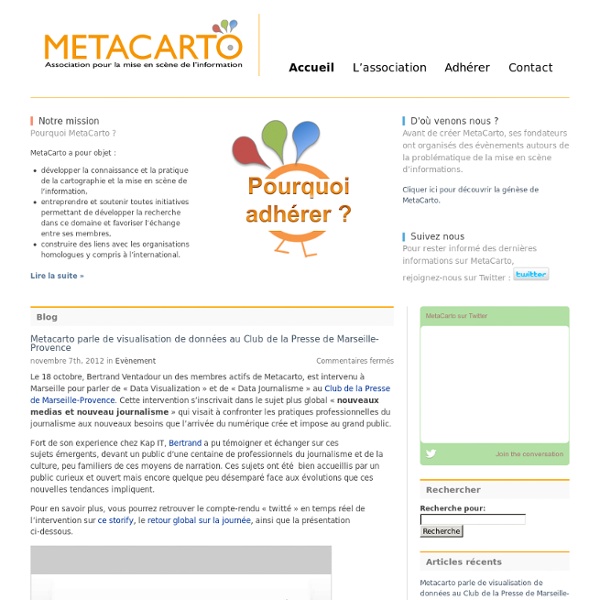



Visualisation de l'information : de multiples outils Dans un monde où l'information est toujours plus abondante, le professionnel rencontre souvent des difficultés – même s'il utilise des méthodologies de recherche efficaces – pour analyser et traiter des volumes d'information qui peuvent être importants. De nombreux outils, dont plusieurs gratuits, peuvent heureusement lui permettre de manipuler les données, de les visualiser graphiquement et de mettre ainsi en évidence modèles et tendances. Pour découvrir ces outils, on pourra consulter avec profit les dossiers, recensements et supports cités ci-après. Dans un article d'avril 2011 paru dans Computerworld et intitulé "Image gallery: 22 free tools for data visualization and analysis", Sharon Machlis proposait déjà un recensement de 22 outils, classés dans un tableau indiquant pour chacun leur usage, la plateforme (navigateur, code...), le "niveau" de difficulté, etc., suivi d'une copie d'écran pour chacun des outils. +Béatrice Foenix-Riou
Legal Problem Solving It's possible some of these books will be referenced in class lectures and discussions. Prof Moon certainly will encourage students to engage with them all. This list will grow over the course of the semester. The Art of Innovation / Tom Kelley Business Model Generation / Alex Osterwalder, Yves Pigneur Change by Design / Tim Brown The Designing for Growth Fieldbook / Jeanne Liedtka, Tim Ogilvie, Rachel Brozenske The Non-Designer's Design Book (Fourth Edition) / Robin Williams The Service Startup / Tenny Pinheiro The Service Innovation Handbook / Lucy Kimbell Sketch Thinking / Jose Berengueres Solving Problems with Design Thinking / Jeanne Liedtka, Andrew King, Kevin Bennett Sprint / Jake Knapp The Strategic Designer / David Holston Typography for Lawyers (2nd Ed.) / Matthew Butterick Universal Methods of Design / Bella Martin, Bruce Hanington Value Proposition Design / Alex Osterwalder et al. Creative People Must Be Stopped / Dave Owens Gamestorming / Dave Gray, Sunni Brown, James Macanufo
Pascal Venier — Consultant | Digital Scholar Xtranet ACE Le LEGAL VISUAL DESIGN Comment rendre clairs et impactants mes messages ? Comment rendre inoubliables mes prochaines présentations juridiques ? Par Fabrice Mauléon* Le sujet Le Legal Visual Design est la branche particulière du Legal Design qui permet de répondre aux questions : « comment rendre clairs et percutants mes messages – que ce soit des explications quant à des règles de droit ; ou mes différents messages sur mon site professionnel ou mes différents supports de communication ? Le programme en 0,5 jour : 1ère partie : Les règles de la pensée visuelle – pourquoi et comment rendre impactants demain mes messages (1H30 mn) Le Legal Visual Design fait découvrir comment et pourquoi le processus de la pensée visuelle permet de résoudre des problèmes efficacement et rend clairs les messages les plus complexes – en particulier dans le domaine du droit.
Peace of Mind